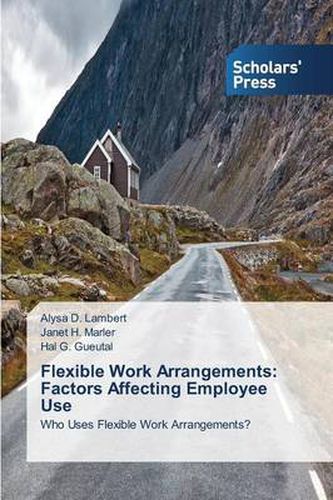Readings Newsletter
Become a Readings Member to make your shopping experience even easier.
Sign in or sign up for free!
You’re not far away from qualifying for FREE standard shipping within Australia
You’ve qualified for FREE standard shipping within Australia
The cart is loading…






This title is printed to order. This book may have been self-published. If so, we cannot guarantee the quality of the content. In the main most books will have gone through the editing process however some may not. We therefore suggest that you be aware of this before ordering this book. If in doubt check either the author or publisher’s details as we are unable to accept any returns unless they are faulty. Please contact us if you have any questions.
Flexible Work Arrangements (FWAs) are designed to provide employees with some level of control over when and where they work outside of the standard workday. FWAs have been linked to positive outcomes such as lower work-family conflict and increased work-family balance as well as reduced healthcare costs and turnover; but, little is known about why employees use FWAs. Data revealed several predictors of FWAs. Individuals with longer tenure, who had supervisory responsibilities and had a coworker who used FWAs, were more likely to use the programs. Individuals with stronger coworker support and who worked more hours per week were less likely to use FWAs. Including flexible schedules as a work option can be used as a tool to help organizations increase the commitment and satisfaction of their employees as it allows them to make their time away from work more productive. Organizations should consider all requests for flexible schedules and work with each employee to achieve a solution that will aid them in balancing their lives more efficiently while still allowing the organization to achieve its goals.
$9.00 standard shipping within Australia
FREE standard shipping within Australia for orders over $100.00
Express & International shipping calculated at checkout
This title is printed to order. This book may have been self-published. If so, we cannot guarantee the quality of the content. In the main most books will have gone through the editing process however some may not. We therefore suggest that you be aware of this before ordering this book. If in doubt check either the author or publisher’s details as we are unable to accept any returns unless they are faulty. Please contact us if you have any questions.
Flexible Work Arrangements (FWAs) are designed to provide employees with some level of control over when and where they work outside of the standard workday. FWAs have been linked to positive outcomes such as lower work-family conflict and increased work-family balance as well as reduced healthcare costs and turnover; but, little is known about why employees use FWAs. Data revealed several predictors of FWAs. Individuals with longer tenure, who had supervisory responsibilities and had a coworker who used FWAs, were more likely to use the programs. Individuals with stronger coworker support and who worked more hours per week were less likely to use FWAs. Including flexible schedules as a work option can be used as a tool to help organizations increase the commitment and satisfaction of their employees as it allows them to make their time away from work more productive. Organizations should consider all requests for flexible schedules and work with each employee to achieve a solution that will aid them in balancing their lives more efficiently while still allowing the organization to achieve its goals.